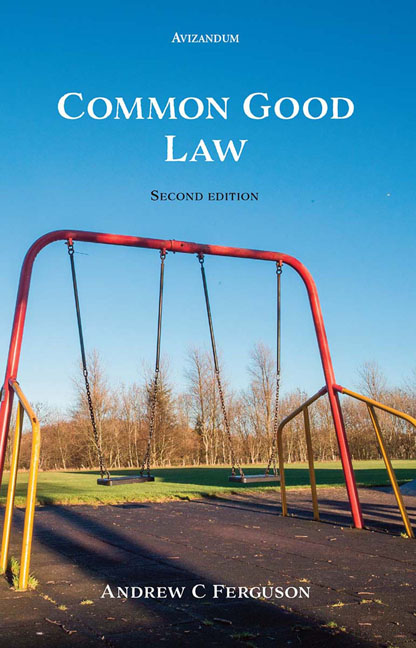Book contents
- Frontmatter
- Contents
- Preface
- Tables of Legislation
- Table of Cases
- 1 Origins and Definitions
- 2 Statutory Framework
- 3 The Administration of the Common Good
- 4 Inalienable Common Good Property
- 5 Classification of Common Good Land
- 6 Appropriation, Alienation and Disposal of Common Good Land
- 7 When Does ‘a Question’ Arise?
- 8 Factors Involved in Allowing Disposal
- 9 Taking a Common Good Case to Court
- 10 Common Good and Community Empowerment
- Appendix I List of Burghs
- Appendix II Disposal, Appropriation and Alienation
- Index
3 - The Administration of the Common Good
Published online by Cambridge University Press: 20 October 2020
- Frontmatter
- Contents
- Preface
- Tables of Legislation
- Table of Cases
- 1 Origins and Definitions
- 2 Statutory Framework
- 3 The Administration of the Common Good
- 4 Inalienable Common Good Property
- 5 Classification of Common Good Land
- 6 Appropriation, Alienation and Disposal of Common Good Land
- 7 When Does ‘a Question’ Arise?
- 8 Factors Involved in Allowing Disposal
- 9 Taking a Common Good Case to Court
- 10 Common Good and Community Empowerment
- Appendix I List of Burghs
- Appendix II Disposal, Appropriation and Alienation
- Index
Summary
Administration and delegation in local authorities
Chapter 2 showed how statutory provisions relating to the disposal of common good land nest amongst overall provisions relating to the acquisition, appropriation and disposal of local authority land generally. In the same way, the law relating to the administration of the common good fund and any of its assets - scanty as it may be - is supplemented by the general law relating to the administration of local authority monies and assets. This might seem obvious. However, it is important to recognise that the requirement in local authorities to have regard to the inhabitants of the former burgh areas (or, in the case of the cities, all of the areas) does not stand alone. Nor is it in some way ¢reproof against being affected by subsequent statutory provisions where these conflict with it.
Section 56 of the Local Government (Scotland) Act 1973 remains the basic foundation for how local authorities are administered. In terms of section 56, the local authority can arrange for the discharge of any of its functions by a committee, a sub-committee, an officer or (although this is extremely unlikely in the context of common good) another local authority in Scotland. However, each council is a body corporate and, in theory, every decision of a council in relation to the discharge of its functions must trace back to an original decision of the council as a corporate body.
The practical effect of this, in most councils, is that the day-to-day decision-making function of the council is spread down through a system of committees, sub-committees, and individual offcers. Two key documents for this process are the scheme of administration (or list of committee powers) -which sets out what functions are delegated from the full council down to committee and sub-committee level - and the scheme of delegation (or list of offcer powers), which does the same for delegation to offcers. A third key governance document is the set of standing orders which govern procedurally how decisions are made at committee.
In most councils, decisions relating to the common good are either taken by a specific common good committee or subcommittee, or by a property or policy and resources committee, particularly in relation to land disposal issues.
- Type
- Chapter
- Information
- Common Good Law , pp. 34 - 52Publisher: Edinburgh University PressPrint publication year: 2020



